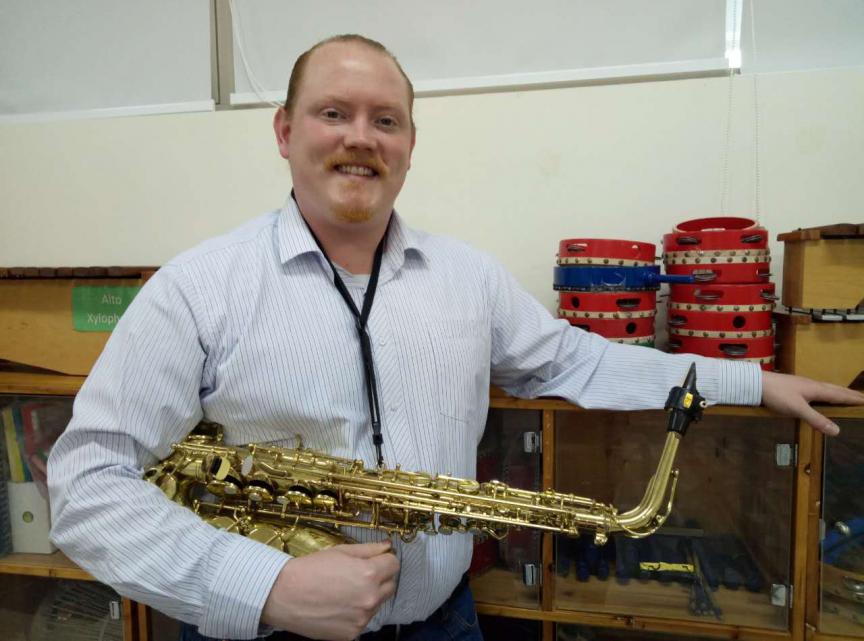Nicholas Howard has developed a unique perspective on the value of online learning as a music teacher in Shanghai during a coronavirus quarantine that has kept his students out of the classroom for more than a month.
Howard, a candidate for a master’s degree in music and music education at the Mason Gross School of the Arts, is using his experience doing all of his graduate work via the internet through the Rutgers Arts Online program to adapt all of the classes he is teaching to the web.
“The opening of schools has been delayed three times already,” the Sandwich, Ill., native said in an email. “We’re not sure when it will really happen.”
Because he teaches grades 1 through 12, Howard had to rework his classes for online teaching, while also tailoring that teaching to different age levels. He’s also needed to make allowances for the natural anxieties of students living in the midst of an epidemic.
“In light of how difficult it can be for some of them to adjust, I’ve taken a light approach to engaging with them,” the Rutgers University-New Brunswick student writes. “For my elementary students, that entails listening and responding to music, as well as writing song lyrics or just dancing to a new song. My orchestra students are focusing on projects in their core subject classes. We’ve had to go through a bit of a triage scenario, so they spend about 20 minutes each day on music theory concepts and exercises.”
The adjustment has its challenges. Its benefits, too.
“Inhibiting the opportunity for conversation is a distinct problem,” he admits. “The one silver lining to this style of learning, which is potentially detrimental to students who are not literate with technology or the language of instruction, is that it demands their independence, and parent involvement.”
The greatest benefit to the online instruction, of course, is that students – who might otherwise be merely sitting at home, watching television – can keep up with their studies. They can also communicate with classmates and feel, not only that they’re still part of the school community, but part of a larger world.
It’s an advantage that all online students share – even those not under quarantine.
“It provides so much flexibility,” says Ruqqayya Maudoodi, director of the Rutgers Arts Online program. “Having to be at a specific place at a specific time – that kind of limitation is not workable for a lot of people today, with so many things pulling at them. Online learning breaks down a lot of barriers in term of geography and time and mobility.”
And, she says, while the aim is “to make the online experience as close as possible to the in-class experience,” the differences are celebrated, too.
“Online, students are interacting with other students from all over the world,” she says. “It’s a very robust communication system. I’ve heard instructors say it’s even more robust than face-to-face classes. There, students can be more passive, just sitting in the back of the class and taking notes. With the online interface, students have to respond; if there’s a discussion, they need to participate. There’s no passive acquisition of knowledge anymore.”
The advantages were clear to Howard, who joined the 10,000 other online students at Mason Gross School of the Arts about 18 months ago.
“I was comparison shopping among four universities, and I appreciated the program’s clear, concise course offerings,” he says. “Other programs had strange schedules, or seemingly random classes. Rutgers Arts Online really offers an online program tailored for the degree.”
Of course, at the time he didn’t realize just how valuable one of those courses – “Integrating Technology into Music Education Curriculum” – would turn out to be.
Yet while he and his students have adjusted to their temporary long-distance relationship, daily life in China can still be a bit of a challenge, he admits.
“Some grocery stores have returned to delivery services,” he says. “But I have to walk to the security gate at the edge of the apartment complex to pick them up, and then doubly disinfect everything once it’s laid out on the dining-room floor. Other than that, I spend the day in the apartment working or playing a video game.”
It’s all been a bit of an unexpected adventure for Howard.
“I guess the itch to travel I attained by visiting Italy at 13 needed scratching,” he says. “A family friend returned from teaching English in Turkey for summer vacation when I was 16 – that was the first time I had heard of international teaching. I didn’t aim for China per se, but the first job I was offered was in Shenyang, in the northeast. After two years there, I came to Shanghai.”
His teaching duties end on July 31. He expects to complete his Master of Music in Music Education Online degree the following month.
After he returns home, Howard – whose own listening favorites range from “Romantic and Impressionist, to electronic and experimental” – aims to “land a job as a music or arts department chair, which includes an instrumental ensemble conducting position. I’m happy just to make steady, on-and-ever-upward progress in my career.”'
With hopes, perhaps, that the future brings a little more music, and a little less drama.

